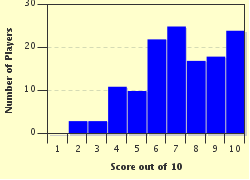Quiz Answer Key and Fun Facts
1. Did Geoffrey of Monmouth invent the persona of this knight, or did he really exist? Name the knight, who according to Geoffrey, eventually became king of Britain.
2. Known at an early age for his chivalry and military ability, which knight joined with his brothers in a not-so-chivalrous attempt to overthrow their father, the King of England?
3. Which knight, the Spanish national hero known as "El Cid", captured Valencia from the Moors in 1094?
4. Which Russian national hero knight was canonized by the Russian Orthodox Church after his death in 1263?
5. Which English knight, likely named after the armor he wore, gained recognition during the Hundred Years War at the Battles of Crécy and Poitiers?
6. After killing the English sheriff of Lanark, which Scottish knight became a leader in the Wars of Scottish Independence?
7. Which English knight, known for his quick temper, was killed in the Battle of Shrewsbury while fighting against his king?
8. Nicknamed the "Eagle of Brittany", which French knight was Constable of France from 1370-1380?
9. Perhaps knighted by the Black Prince, which English knight not only fought in the Hundred Years' War, but also served as a mercenary in Italy?
10. Which knight, who became the 1st Earl of Pembroke, rose to prominence due to his bravery in tournaments and warfare? He not only served King Henry II, but also his sons, Richard and John, and his grandson, Henry III.
Source: Author
ponycargirl
This quiz was reviewed by FunTrivia editor
bloomsby before going online.
Any errors found in FunTrivia content are routinely corrected through our feedback system.

